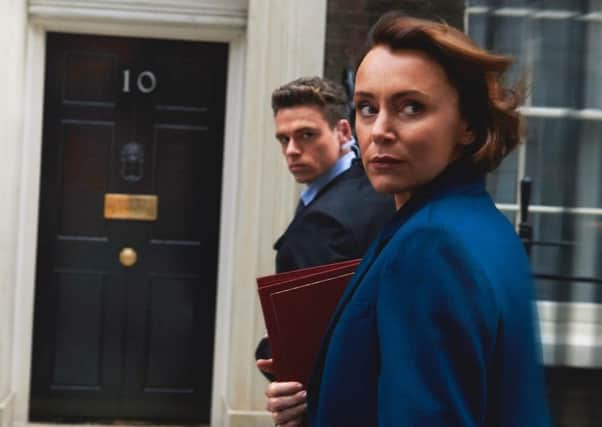David Blunkett: Living the reality behind BBC thriller Bodyguard


The show – starring Keeley Hawes as the Home Secretary and Richard Madden as the troubled former soldier turned police officer assigned to protect her – has become the biggest new drama on British television in more than a decade, with more than 10 million viewers. It has also won great critical acclaim for creator and writer Jed Mercurio, who also came up with the much-loved Line of Duty.
Given that so much has already been commented on, you might wonder why I am adding to the commentary?
Advertisement
Hide AdAdvertisement
Hide AdTo begin with, as an ex-Home Secretary, having taken over three months before the attack on the World Trade Centre on September 11, 2001 when more than 3,000 people lost their lives, it is fair to say I have a considerable interest in the reality of receiving what is called Close Protection.
Not quite so close as the Home Secretary portrayed on screen – and it has to be said that I was never protected by a member of the opposite sex.
As someone who had political oversight of the security service, MI5, and more than a passing interest in the counterterrorism operation of the Metropolitan Police, I’m not only taken up with the storyline, as millions of viewers clearly are, but also with how the different players are portrayed.
For the general viewer, this is about gripping entertainment.
Advertisement
Hide AdAdvertisement
Hide AdI appreciate that the detailed reality may not be uppermost in the mind of viewers but I am sorry that a little more explanation of who works for whom, didn’t broaden the understanding of the viewing public.
You might also be wondering how someone who can’t see engages with a six-part series. The answer is with a little help from my friends – in this case my wife, Margaret.
There is for those who have no or poor sight, Audio Description. You may have come across some of the adverts recently which have been promoting what is a growing and excellent service.
However, if you have someone who can see with you, it’s often better to ride with their description.
Advertisement
Hide AdAdvertisement
Hide AdNot least these days because of the pause and rewind function, which allows us not only to take a look at the visuals and for them to be described in more detail but also to revisit the ‘mumbling’, which constitutes much modern television drama.
Anyway, the upshot is I have a pretty good grasp of what’s been going on and because of my own knowledge of having been there, experienced the threat and lived with the protection, I cannot resist reflecting on the good and on the what might have been!
It is good. It’s fast-moving, it’s clearly a thriller and it touches on something that appears to be in the national psyche – conspiracy theories.
However, I can’t help but thinking that four episodes might have been better than six.
Advertisement
Hide AdAdvertisement
Hide AdAficionados of John Le Carré novels will know that historically MI5, the security service which is responsible for internal security, has had a very mixed relationship with the various iterations of counter-terrorism operations run from the Metropolitan Police and beyond.
This is a key part of the plot of the three episodes that have been shown so far, but in real life, things were getting a lot better on my watch between 2001 and 2005, and I understand have improved still further in the intervening 13 years.
Even at their worst however, it would be highly unlikely that the preference of the Home Secretary would so irritate senior counterterrorism officers that they would conspire to see her removed ‘terminally’ from the job, as the plot seems to be suggesting.
Equally, although the BBC’s security correspondent, Frank Gardner, of whom I am a long-standing admirer, thinks I’m wrong about this, vetting would undoubtedly pick up someone with Post Traumatic Stress Disorder, which is being suffered by Richard Madden’s character.
Advertisement
Hide AdAdvertisement
Hide AdBut of course it would spoil the whole thing if, along with his own family personal problems, he didn’t have long-standing psychiatric fallout from being asked by politicians, as a soldier, to do what soldiers do.
I very much hope that viewers have been able to distinguish between the different branches of the service – including who are civil servants and therefore who actually has ‘operational’ responsibility, and who gets disciplined by whom.
So what about my own time and experience with extremely heightened tension when I was the Home Secretary?
The truth is, you daren’t think about it. You simply have to get on with the job otherwise you’ll atrophy. You’d never take a decision, you wouldn’t be brave about the kind of legislation necessary to protect the nation, and you’d constantly be literally on edge.
Advertisement
Hide AdAdvertisement
Hide AdSo it’s not about being ‘brave’ or even foolhardy. It is simple, you have to get on with the job.
Only at times of the most heightened tension did I ever have an armoured car. During the episode in the drama when the bullets thudded in to the armoured vehicle, I did reflect for a moment on how vulnerable I must have been for so much of the time.
But unlike the television presentation, the rapid response vehicles and certainly the guys in the backup vehicle, would have been in action almost immediately. The fact that they were not is, of course, all part of the storyline!
So, as in Line of Duty, great acting once again by Keeley Hawes, and yes, I will be tuning in to the next three episodes.
Bodyguard is on Sunday nights on BBC One and available via iPlayer.